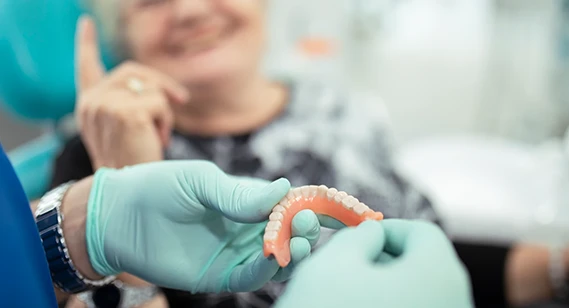LEARN ABOUT OUR SAFETY COMMITMENT
Menu
- New Patients:
- 727-219-1369
- Current patients:
- 727-494-7179
Menu
Dentures are a common solution for individuals dealing with missing teeth, offering both functional and aesthetic benefits. However, as time passes and oral conditions change, some denture wearers may find that their prosthetics don’t fit as snugly as they once did. This can lead to discomfort, difficulty eating, and self-consciousness about denture movement or slippage. In such cases, denture adhesive can be a helpful tool to improve the fit and stability of your dentures. But how do you know if you need denture adhesive? Let us find out how to tell if you need Denture Adhesive.
One of the most obvious signs that you may need denture adhesive is if your dentures feel loose or unstable in your mouth. As time passes, changes in your jawbone and gum tissues can cause your dentures to fit less securely. This can be particularly noticeable when eating or speaking, leading to discomfort and potential embarrassment.

Do you find it challenging to bite and chew certain foods with your dentures? If you’re experiencing difficulty eating foods that were once easy to enjoy, it could be due to your dentures not fitting properly. Using denture adhesive can help create a stronger bond between your dentures and gums, improving your ability to eat a wider variety of foods comfortably.
Ill-fitting dentures can also impact your speech. If you’ve noticed changes in your ability to pronounce certain words or if you find yourself lisping or slurring more than usual, it might be time to consider using denture adhesive. A more secure denture fit can enhance your confidence while speaking and reduce speech-related frustrations.
The constant movement of loose dentures can cause friction and irritation in your gums. If you’ve developed sore spots or redness on your gum tissues where the dentures rub, using denture adhesive can help minimize movement and alleviate discomfort.
When your dentures no longer fit properly, they may leave visible gaps between the denture base and your gums. These gaps can trap food particles, leading to hygiene issues and potential gum irritation. Using denture adhesive can help fill these gaps and create a more secure seal.
Over time, the jawbone can undergo changes, especially if you’ve had teeth extracted prior to getting dentures. These changes affect the fit of your dentures, causing them to become loose. If you’ve noticed significant changes in your jawbone structure or if your dentures no longer align properly with your gums, denture adhesive provides temporary relief until you can see your dentist for adjustments or replacements.
Do you hear clicking sounds when you talk or eat with your dentures? This clicking or slipping sensation indicates that your dentures are not securely in place. Denture adhesive can help reduce or eliminate these unwanted movements, improving your overall comfort and confidence.
Denture adhesive can be used to:
Different types of denture adhesive are available, including pastes, powders, wafers, and strips, with pastes being the most commonly used. Your choice depends on what matters most to you, such as convenience, a snug fit, or easy cleaning. If one type doesn’t work well, trying others can help you find the best fit for your needs.
A good denture adhesive should make your dentures more stable and improve the seal of your gums. This not only boosts your confidence when speaking and eating but also prevents food from getting stuck between your dentures and gums.
Fixed, not removable
Costs an average of around $2,500+ depending on the type of material chosen and the number of teeth required- another factor is the type of bridge
Requires 2 or more appointments over the course of a few weeks
Usually requires replacement after about 10 to 15 years, may last about 10 with proper care and maintenance
Fixed, not removable
Costs $5,000+ for a single implant and up to $60,000+ for full-mouth restoration. Hybrid options cost an average of $12,000 per arch
Requires multiple appointments over several months to a year or more
Implant screw should last a lifetime but the restoration may need to be replaced after about 20 years
When applied correctly, dentures should stay in place for most of the day, although some people may need to reapply adhesive occasionally. If your dentures frequently become loose, consult your dental professional for guidance or adjustments.
Here are the steps to properly apply denture adhesive:
You can maintain Good Oral Hygiene with Dentures with the help of the following ways-
Recognizing the signs that indicate you may need denture adhesive is crucial for improving your overall denture-wearing experience. Whether you’re facing issues with loose dentures, discomfort while eating, or speech difficulties, denture adhesive can offer temporary relief. However, it’s essential to consult your dental professional for personalized advice and proper denture care to maintain optimal oral health.
Ready to improve your denture comfort and stability? Contact Precision Dental in New Port Richey, FL, to schedule an appointment online for new patients or call us at 727-219-1369. Current patients can reach us at 727-494-7179 for any dental concerns or adjustments.
When used correctly, denture adhesive should not damage your dentures. Follow the instructions provided and avoid overusing adhesive.
Apply denture adhesive as needed for a snug fit. Some individuals may need to reapply adhesive throughout the day for optimal comfort.
Your dentist can evaluate your dentures and recommend adjustments or replacements for a better fit. Denture relining or rebasing may also be options to consider.
Friday (Good Friday)
9 AM–2 PM Hours might differ